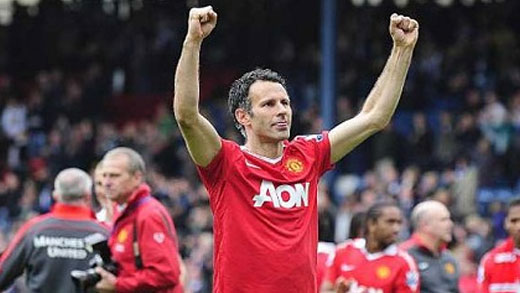News
Ryan Giggs provides a timely reminder of true value with 12th league title

As the paeans of praise and the elegies of delight washed down the Darwen End of Ewood Park, as his players bounced and hugged and sang, the Manchester United manager sought out Ryan Giggs and embraced him. As he has for two decades, he wished to share this moment with him.
In the golden epoch the Scotsman has built at Old Trafford, the Welshman has been his constant. Giggs would not have become the most decorated player in English football history had it not been for Ferguson; manager, though, knows well enough that each of his own dozen Premier League winners’ medals is owed, in part, to player.
Ferguson might not have won his second - and his first double - in 1994 if he had not been able to call on the shimmying hips, the explosive burst, the unerring instincts of his wonderboy-winger; his goals against QPR and Leeds stand out.
Two years later, Giggs remained instrumental, more so than ever, a subtle genius added to his play, an ability to summon not just the unpredictable but also the unexpected. Witness his goal against Manchester City at Maine Road, sealing a crucial 3-2 win, the ball arrowed into Eike Immel’s top corner, almost defying physics.
In 1999, his slaloming run against Arsenal kept United’s treble dream alive and gave all of Villa Park twisted blood; a week earlier, it was his late equaliser in the Champions League semi-final first leg against Juventus which gave Roy Keane his chance to etch his name in legend in Turin.
Those vignettes now seem as though they are snapshots of the artist as a young man. That was Giggs, it seemed, at his peak. How he endures. But how he has changed, too.
There are a few more wrinkles, a sprinkling of grey in the jet-black hair. And the jet heels have been cooled, but replaced by a sense of calm. Giggs, more than anyone else at Manchester United, does what he wants.
This season might not have produced as many moments for the scrapbook, but the 12th title winners’ medal is the one he owes most to Giggs. The Welshman remarked last week that he did not know who United’s player of the year should be. Easy. It is him.
He has enough faith in his team-mates to wholeheartedly dismiss suggestions that this is the worst United team he has been part of; his view, first-hand, warrants respect.
“Obviously we’re rubbish - we’ve won the Premier League and we’re in the Champions League final,” he said. “Twenty years ago we were nowhere near Liverpool, but we’ve gone past our biggest rivals. This is why I keep going, for days like this. It’s amazing. This team is a pleasure to play in.”
He finished this fixture as a left-winger, as he used to be, but he spent most of it in the central midfield role he has filled with such distinction this year. It was his pass that found Javier Hernández, a player with the sort of acceleration Giggs remembers, racing through the middle, which led to Wayne Rooney’s penalty, which led to that record 19th title.
And it was Giggs who filled in at left-back when Ferguson required him to do so; it was Giggs who dictated tempo, who played the role of spiritual leader as United’s nerves frayed. That is why it was Giggs who the Scot sought out as made his way on to the Ewood Park pitch. He has gone from hotshot to the general’s trusted lieutenant.
And yet, in his importance, a word of warning: Giggs might be better than ever, but he is not capable of defying time. The Welshman will have observed the fate the clock had for Paul Scholes, one final bright, shining burst, going supernova before the inevitable fade.
Giggs might have another year, he may even have another two.Eventually, he will need to be replaced. The more irreplaceable he becomes, the more intractable a problem that becomes.
As Ferguson strolled to the Darwen End, a beatified smile on his face, he wanted to embrace his go-to guy. He will not want to face the day when he is no longer there, the day when he finds him gone.


